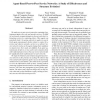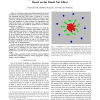180 search results - page 7 / 36 » Effects of Local Information on Group Behavior |
PG
2002
IEEE
14 years 1 months ago
2002
IEEE
Flocking behavior is very common in nature, and there have been ongoing research efforts to simulate such behavior in computer animations and robotics applications. Generally, suc...
ATAL
2004
Springer
14 years 2 months ago
2004
Springer
We study peer-to-peer service networks consisting of autonomous agents who seek and provide services. To fulfill its local needs, an agent attempts to discover and select informa...
IROS
2009
IEEE
14 years 3 months ago
2009
IEEE
— We study a simple algorithm inspired by the Brazil nut effect for achieving segregation in a swarm of mobile robots. The algorithm lets each robot mimic a particle of a certain...
ISDA
2009
IEEE
14 years 3 months ago
2009
IEEE
Educational process mining (EPM) aims at (i) constructing complete and compact educational process models that are able to reproduce all observed behavior (process model discovery...
AAAI
2010
13 years 10 months ago
2010
Modeling human behavior requires vast quantities of accurately labeled training data, but for ubiquitous people-aware applications such data is rarely attainable. Even researchers...


